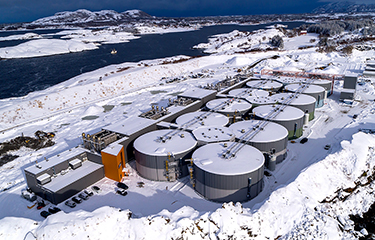Salmon Evolution’s losses jump in Q1 2023, but production ramping up

Salmon Evolution reported lower revenue and widening losses in Q1 2023 on the heels of dealing with an outbreak of amoebic gill disease that caused elevated mortality at its land-based farm in Indre Harøy, Norway.
The Molde, Norway-based company posted a total operating revenue of NOK 2.97 million (USD 271,000, EUR 251,620) in Q1 2023, down from NOK 6.81 million (USD 621,599, EUR 576,955) during the same period last year. The company’s operational earnings before interest, taxes, depreciation, and amortization (EBITDA) also dropped heavily to a loss of NOK 22.3 million (USD 2.1 million, EUR 1.9 million), down from a loss of NOK 9.9 million (USD 903,600, EUR 838,700) in Q1 2022. Operating profit also dropped, with the company losing NOK 24 million (USD 2.1 million, EUR 2.0 million), more than double what it lost in 2022.
Despite the losses and the issues with mortality, the company said it is making progress at its land-based flow-through aquaculture facility in Indre Harøy. The company said there was an increase in biomass production in Q1, with a net biomass production of 740 metric tons (MT) and an “all-time high” biomass production of 320 MT in March alone. As of 31 March, Salmon Evolution said, it had a standing biomass of almost 1,500 MT in its facility.
So far, the company has stocked five batches of salmon, and two smolt releases are scheduled for Q2 and three are planned for the second half of 2023.
Phase one of its Indre Harøy was fully completed in April 2023, meaning all 12 tanks are completed. The company said this will enable it to streamline its production. It said in has begun its phase-two expansion project.
“The company has made no contractual commitments but is in advanced negotiations with contractors for phase two construction,” Salmon Evolution said.
In a release reviewing its Q1 2023 results, the company said that its bout of amoebic gill disease was an “important reminder of the biological aspect of the operation” but also demonstrated the value of being in the hear of the “aquaculture cluster” in Norway, where it can access the needed infrastructure to deal with the issue.
“The company has taken swift and appropriate actions to remedy the situation, including reduced temperatures and feeding, increased UV dosage on intake water, fast tracking harvest of batch two in a historically strong market, and completed freshwater treatment of all remaining fish groups,” Salmon Evolution said. “The freshwater treatment appears to have had a good effect, and the situation is now stabilizing with daily mortality back to normal levels post freshwater treatment.”
Salmon Evolution CEO Trond Håkon Schaug-Pettersen said the farm's operations have been stabilized and that the company has transitioned back to a “production modus.”
“The successfully completed freshwater treatment also gives invaluable operational experience that will enhance our capabilities to tackle challenges going forward” Schaug-Pettersen said.
The company said that its long-term plans for land-based salmon farming remain unchanged. The company is planning to reach 100,000 MT of annual production across multiple production facilities worldwide by 2032. The company is working via joint venture with Dongwon Industries to build a land-based salmon farm in South Korea, and it said it has initiated an expansion plan into North America. Overall, the company plans for its Norwegian and North American operations to produce 31,500 MT each, with the South Korean operations producing 16,800 MT or more.
Photo courtesy of Salmon Evolution






Share